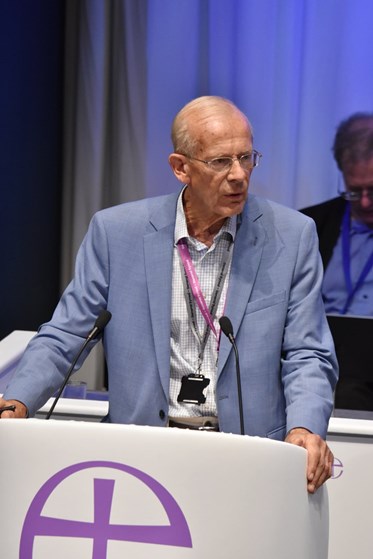A “VAST cloud of witnesses to injustice” were thanked on the floor of the General Synod on Saturday, as members voted to welcome a package designed to improve the clergy pension.
The debate followed an announcement earlier this month that the clergy pension was to be restored to two-thirds of pensionable stipend: the reversal of a change made in 2011 (News, 23 May). This will be applied retrospectively: those already retired will see a pension increase reflecting a two-thirds accrual rate since 2011.
Moving the motion, which welcomed a “significant and immediate step towards correcting an historic injustice”, Canon James Blandford-Baker (Ely) said that the work belonged to “a vast cloud of witnesses to injustice and in many cases poverty among retired clergy”. Two thousand clergy had joined the Clergy Action Facebook Group, 700 had signed a letter to the Church Times, and 192 members had signed the private member’s motion, he said.
The motion also calls on the Archbishops’ Council to commission a “comprehensive, independent review of what is needed to ensure that clergy and their dependants are supported in retirement with dignity and fairness”. It requests that this be chaired by an independent lay person “with a working group representing all relevant interests, and engaging fully with clergy, clergy spouses, retired clergy and other stakeholders”, and that it should report back to the Synod within 12 months.
 Sam Atkins/Church TimesThe chair of the Pensions Board, Clive Mather, said that he was “delighted” with the proposals
Sam Atkins/Church TimesThe chair of the Pensions Board, Clive Mather, said that he was “delighted” with the proposals
The review was necessary, Canon Blandford-Baker suggested, to ensure “we never end up in this place again.” There were “deep structural questions to be faced”. Some clergy were paying the entirety of their pension back to the Church through the clergy-housing retirement scheme (CHARM), he said. Some were unable to live near to children, grandchildren, or friends, or “lost on some soulless new estate disconnected from public transport and unable to access vital public services”.
Canon Blandford-Baker called for a pension “that provides dignity nor poverty” and suggested that the current decline in ordinand numbers could be the “direct result” of the current “poor provision”.
A layman from the diocese of Southwell & Nottingham, Ian Boothroyd, highlighted the situation of those clergy who had retired after 2022, during a period of high inflation.
The Ven. Dr Adrian Youings (Bath & Wells), formerly Archdeacon of Bath, said that one quarter of all Sunday services were taken by retired clergy. The Revd Lis Goddard (London) was concerned about the inequity experienced by those who had a portfolio ministry, or by women who might take house-for-duty posts as a way of serving part-time while caring for young children.
The chair of the Pensions Board, Clive Mather, said that he was “delighted” with the proposals and that a “unified implementation date” of 1 April 2026 had been set. He cautioned, however: “This is very, very difficult. The number of individual calculations that need to be made are simply mind-bending and there are all sorts of issues around taxation and personal circumstances. . .
“Please don’t start ringing us or writing to us in the middle of April and May to tell you what is happening; we won’t be able to . . . What we will do is keep you updated through the web.”
The Revd Dr Ian Paul (Southwell & Nottingham), who last year moved the private member’s motion that served as a catalyst for the commitment to improving clergy pensions (News, 16 February 2024), spoke of “persistence over many years” and thanked colleagues in the national church institutions. He said that the chief executive of the Pensions Board, John Ball, had “taken the time and trouble” to read every single story shared by the Clergy Pension Action Group. One person had written of the new settlement: “I no longer fear retirement.”

















